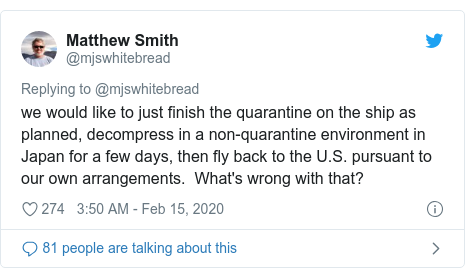Two planes carrying hundreds of US citizens from a coronavirus-hit cruise ship have left Japan, officials say.
There were some 400 Americans on board the Diamond Princess. The ship with some 3,700 passengers and crew has been in quarantine since 3 February.
One of the planes has landed at a US Air Force base in California, and people will be quarantined for 14 days.
Meanwhile, China reported a total of 2,048 new cases on Monday - 1,933 of which were from Hubei province.
More than 70,500 people nationwide have already been infected by the virus. In Hubei alone, the official number of cases currently stands at 58,182, with 1,692 deaths. Most new cases and deaths have been reported in Wuhan, Hubei’s largest city.
In other developments:
- In Japan, a public gathering to celebrate the birthday of new Emperor Naruhito later this week has been cancelled, due to concerns over the spread of the outbreak
- In China, the National People’s Congress standing committee has said it will meet next week to discuss a delay of this year’s Congress because of the outbreak
- At the weekend, an American woman tested positive for the virus after leaving a cruise liner docked off the coast of Cambodia.
What’s happening to the US ship?
The Diamond Princess has been quarantined in Japan’s port of Yokohama after a man who disembarked in Hong Kong was found to have the virus.
On Sunday, Japanese officials said the number of infections on the ship had risen by 70 to 355, making it the largest cluster of cases outside China.
At least 40 US citizens who were on board are infected and will be treated in Japan, Dr Anthony Fauci, Director of the National Institute of Allergy and Infectious Diseases told Face the Nation on CBS.
Two aircraft chartered by the US government left Tokyo’s Haneda Airport in the early hours of Monday.
More than 300 passengers are being repatriated voluntarily, the US state department said. Fourteen of them tested positive for the virus and were being kept separate from the other passengers, it said.
- Are coronavirus tests flawed?
- Watching loved ones die without care in Wuhan
- Why Singapore is so vulnerable to virus spread
Those entering the US will undergo a 14-day quarantine, on top of the time they have already spent confined on the ship.
“And the reason for that,” Dr Fauci added, “is that the degree of transmissibility, on that cruise ship, is essentially akin to being in a hotspot.”
Some of the Americans have declined to be evacuated, preferring to wait until the ship quarantine comes to an end on 19 February.
Passenger Matt Smith, a lawyer, said he would not want to travel on a bus to the plane with possibly infected people.

To assist with relief efforts, Japan’s government has given away 2,000 iPhones to passengers on the ship - one for each cabin.
The smartphones were distributed so people could use an app, created by Japan’s health ministry, which links users with doctors, pharmacists and mental health counsellors. Phones registered outside of Japan are unable to access the app.
Other evacuation flights have been arranged to repatriate residents of Israel, Hong Kong and Canada. On Monday, Australia announced that it would evacuate 200 of its citizens too.
Meanwhile, a plane carrying 175 evacuated Nepalis, mostly students, has arrived in Kathmandu from Wuhan.
What is happening in China?
According to official figures for 16 February, 100 people died from the virus in Hubei, the province at the centre of the epidemic. This was down from 139 on Saturday.
The Chinese authorities are tightening curbs on movement to combat the outbreak. People in Hubei province, which has 60 million people, have been ordered to stay at home, though they will be allowed to leave in an emergency.
In addition, a single person from each household will be allowed to leave the building or compound every three days to buy food and essential items.
On housing estates, one entrance will be kept open. It will be guarded to ensure that only residents can enter or leave.
All businesses will stay closed, except chemists, hotels, food shops and medical services.
There will be a ban on the use of private cars, but vehicles used for the delivery of essential goods are exempt.
Meanwhile, authorities in the Chinese capital, Beijing, have ordered everyone returning to the city to go into quarantine for 14 days or risk punishment.
China’s central bank will also disinfect and store used banknotes before recirculating them in a bid to stop the virus spreading.
New cases spiked earlier in the week after a change in the way they were counted but have been falling since. In total, more than 68,500 people have so far been infected in China.
National Health Commission spokesman Mi Feng said the figures showed China was managing to curb the outbreak.
“The effects of epidemic prevention and control in various parts of the country can already be seen.”
The proportion of infected patients considered to be in a “serious condition” has dropped nationwide from more than 15% to just over 7%, according to China‚Äôs State Council.
Taiwan has reported a death from the illness - a taxi driver, 61, who had not travelled abroad recently but had diabetes and hepatitis B, Health Minister Chen Shih-chung said.
The minister said many of his passengers had come from China.
Outside China, there have been more than 500 cases in nearly 30 countries. Four others have died outside mainland China - in France, Hong Kong, the Philippines and Japan.
The virus is a new strain of coronavirus and causes an acute respiratory disease which has been named Covid-19.
BBC












